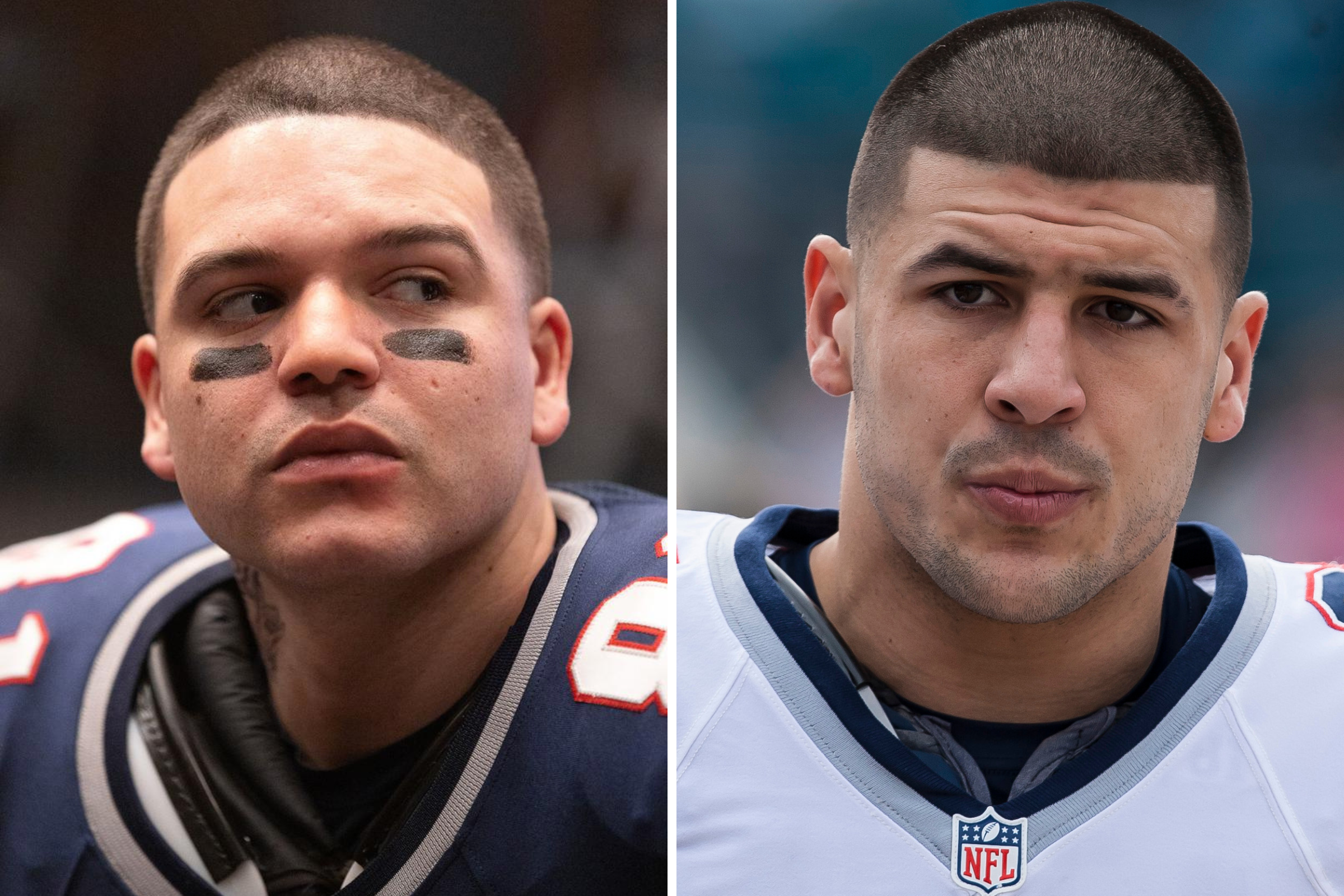Aaron Hernandez actor on filming Odin Lloyd murder scene: ‘Extremely tense’

Josh Rivera, the actor portraying Aaron Hernandez in Ryan Murphy’s new biopic series American Sports Story, reflected with Newsweek on the scene that was hardest for him to film.
The eighth episode of the hit FX series aired last week and centered around the former New England Patriots player’s June 2013 murder of his brother-in-law, Odin Lloyd.
It is believed that Lloyd may have known Hernandez’s deep dark secret that he was attracted to men.
In an interview with Newsweek upon the series premiere in September, Rivera said, “The Odin Lloyd sequence was really, really difficult emotionally for me. That was a night shoot, so already, everybody was very tired, and it was just extremely tense and very sad.”
FX/Getty Images
Rivera continued “I think it really settled into me the reality of, like, you know, a victim and their family. I think we consume things all the time that are interesting when you talk about true crime documentaries or something like that, and there’s this kind of barrier between the reality that exists for whatever reason.”
“I think our brain does it to protect us. I think it’s a psychological mechanism that we have a hard time really digesting that this happened, and these are people that it happened to, and the reality of that really settled with me during that scene.”
Hernandez was once one of the most promising tight ends in the NFL, forming one of the most dangerous tight end tandems in league history with Rob Gronkowski on the Patriots.

Getty Images
However, his football career came to an abrupt and shocking end in 2013 when he was arrested and charged with murdering Lloyd.
Following his arrest, the Patriots released Hernandez from the team.
In 2015, Hernandez was found guilty of first-degree murder and sentenced to life in prison without the possibility of parole. Two years later, Hernandez was acquitted of double homicide charges related to a 2012 case, but just days later, he was found dead in his prison cell, having died by suicide.
Hernandez was implicated in the July 2012 murders of Daniel de Abreu and Safiro Furtado, who were shot and killed in a drive-by shooting in Boston.
Hernandez was eventually charged with the murders in 2014, but he was acquitted in April 2017, just days before his death. The prosecution argued that Hernandez had shot the men after one of them accidentally spilled a drink on him at a nightclub.
Rivera also spoke to Newsweek about how he feels the current prevalence of social media would have impacted Hernandez’s crimes.

Getty Images
“I imagine that he probably would have been suspended a little bit more often from college and from professional games,” Rivera said.
“Maybe people would have been a lot less shocked and blindsided by the whole thing if more people had been recording all the time. I think that was a big part of what made the story so complex is that it seemed like nobody had any idea that something like that was remotely possible, let alone likely. Judging from the impulsiveness of the character, I don’t know if that would have greatly changed his actions, but I think the public perception of it all might have been a little bit different.”
The 10th and final episode of American Sports Story: Aaron Hernandez airs on November 12 at 10 p.m. on FX and streaming next day on Hulu. The previous nine episodes are currently streaming on Hulu.
If you or someone you know is considering suicide, contact the 988 Suicide and Crisis Lifeline by dialing 988, text “988” to the Crisis Text Line at 741741 or go to 988lifeline.org.
Do you have a story Newsweek should be covering? Do you have any questions about this story? Contact LiveNews@newsweek.com
Related
Here’s how Cadillac can become a true American F1 dream…
Credit: Instagram Cadillac (@cadillac) Cadillac F1 stands to have a huge chance to be an American team by and for Americans, something that Formula 1 so badly
Stephen A. Smith Contract Extension – Work Less, Earn More,…
Stephen A. Smith has just landed the contract of his life with ESPN!
American Athletic Conference becomes first league to set ‘minimum standard’…
The American Athletic Conference approved an initiative on Friday to establish a minimum standard of benefits that schools are required to share with athletes i
The NWSL is the first top American sports league to…
When NCAA All-American striker Diana Ordóñez debuted in the NWSL in 2022, there was little more that she could ask from her rookie season with the North Carol











